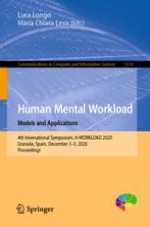2020 | OriginalPaper | Buchkapitel
Task Demand Transition Peak Point Effects on Mental Workload Measures Divergence
verfasst von : Enrique Muñoz-de-Escalona, José Juan Cañas, Chiara Leva, Luca Longo
Erschienen in: Human Mental Workload: Models and Applications
Aktivieren Sie unsere intelligente Suche, um passende Fachinhalte oder Patente zu finden.
Wählen Sie Textabschnitte aus um mit Künstlicher Intelligenz passenden Patente zu finden. powered by
Markieren Sie Textabschnitte, um KI-gestützt weitere passende Inhalte zu finden. powered by
